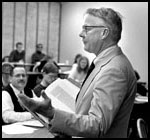Teacher, Mentor, Friend.

Professor Gregory passed away on 12/09/00, just over ten years ago. As I start teaching Patent Law 101 at Maine Law, I would be remiss if I failed to recognized the impact Professor Gregory has had on my life. Professor Gregory was a teacher, a mentor, a friend.
As a teacher, Professor Gregory was my 1L Torts professor. He used the Socratic method and quickly taught a green group of 1Ls how to think about the law. For some of us, the process took longer than for others. I took as many of Professor Gregory’s classes as possible, including Criminal Procedure, Evidence, Remedies, and Intellectual Property. Only Admiralty failed to fit in my schedule. Professor Gregory taught me that the law is not black and white. That we have to struggle with its shades of gray. That, like the rug in his office, the law has patterns that repeat in other, sometimes nonobvious, areas. That the law is what the majority of The Supreme Court says it is.
As a mentor, Professor Gregory introduced me to Thomas L. Bohan, who would become my first employer and another mentor.
As a friend, Professor Gregory kept in touch with me after graduation, always offering good life advice. My first child was born while I was a 3L, and “David Gregory” was one of the names in consideration. My son did not end up taking that name, but I still have the sweater that Professor Gregory and Jane gave to me after my son was born.
It takes a generation for new technology to catch on. Since Newsweek declared 1995 “The Year Of The Internet,” I declare that it will take until 2025 for the Internet to mature. In a mature Internet, historical Internet content should be better preserved when people die. To that end, I reproduce below the full text of Professor Gregory’s faculty bio and Professor Gregory’s valediction, both of which appeared on earlier version’s of Maine Law’s website. Also included below are excerpts from a letter that I wrote after circumstances beyond my control prevented me from attending Professor Gregory’s memorial service.
Professor David D. Gregory: Faculty Bio
Originally published at http://www.law.usm.maine.edu/gregory.htm.
 David D. Gregory, Professor
David D. Gregory, Professor
B.A., Duke University
LL.B., University of Maine
LL.M., Harvard University
Professor Gregory is a teacher par excellence whose Socratic skills are legendary among his present and former students. Before joining the law faculty he worked for the Civil Rights Division of the Department of Justice where he was Director of the Appellate Unit. As counsel to the York County District Attorney he represents the State in criminal appeals to the Supreme Judicial Court of Maine. He has served as executive secretary to the Committee on Judicial Responsibility and Disability, as Special Master for the United States District Court overseeing implementation of the Pineland Center consent decree, as Special Counsel to the Maine House of Representatives in its first impeachment proceedings, and as Chairman of the Maine Commission on Mental Health.
He is the author with Professor Zillman and Attorney Jack Simmons of a treatise on Maine tort law. He currently teaches Admiralty, Remedies, Criminal Procedure and Evidence.
Professor David D. Gregory: Valediction
Originally published at http://www.law.usm.maine.edu/davidgregory.htm.
 The University of Maine School of Law sadly reports that our dear friend and colleague, Professor David Gregory, passed away from cancer on Saturday, December 9th [2000] at Maine Medical Center following a brief hospitalization.
The University of Maine School of Law sadly reports that our dear friend and colleague, Professor David Gregory, passed away from cancer on Saturday, December 9th [2000] at Maine Medical Center following a brief hospitalization.
A Memorial Service in celebration of David’s life was held January 17th [2001]. At the memorial service, the Valediction which David presented annually at the law school commencement was read. Following is the text of the valediction:
Valediction of David Gregory
Every law school class has its own unique character. This class has lots of them. You are not like planets – disparate elements in separate orbits. What is special is the way you have "cohered." It is wonderful to see that even those few who went away to other schools for their last semester or last year have returned to be with their number on this great day. Some members of this class have even fallen in love with each other. Go to law school; find love. Imagine that! To me, you are like stars – of more or less equal brilliance, forming interesting constellations. Hold to those bonds among yourselves.
A few years ago the graduating class asked me to deliver a benediction at graduation – thinking evidently that that meant a few reflective words at the end of the ceremony. But "benediction" means a "blessing" – something that you all who know me must agree I am in a poor position to bestow. Recognizing the honor in being asked, however, I accepted the invitation and changed the name to something I was qualified to give – a valediction – which means a farewell.
I became intrigued with the distinction. I knew, of course, that the common element, diction, meant saying. I discovered that the separate element of valediction comes from valere meaning to be strong, to be well and to be worthy – which must have been a common form of giving good wishes when saying farewell among the Romans. Valediction thus shares a common root with valor, valiant, valid and value.
We who are your tutors are very proud of you. We believe that we have helped you to discover within yourselves valuable intellectual and practical talents. How you use them is up to you.
I do have a few thoughts for your consideration.
Look at reality with a cold, hard, steely-eyed gaze. Lawyers get bad reputations by distorting reality. If you feel yourself losing sight of reality, fear not. I have the solution: Ask you mother.
Preserve the language and speak English. There is a mischievous effort these days to corrupt the language. We should have learned from Orwell that corrupting the language is instrumental in corrupting society. Speak plainly. Part of the lawyer’s task is to communicate what is technical and complex to persons of ordinary intelligence and reasonable prudence. It is contrary to that responsibility to say that a defendant was charged with DVA and OUI but for lack of PC the charges were dropped to SA and DTE.
Recognize that, regardless of what you may have picked up in Law School, not everything is arguable. There really is such a thing as truth. Like justice, truth is something we must strive to attain. On a personal level that means that honesty is the best policy. I tell you that in the hope that you can avoid learning that lesson the hard way.
Avoid single-mindedness. No matter how good one value is, it is never the only one.
The word that gave us the name "valediction" is perfectly suited to signify our leave-taking from you:
Be strong.
Be well.
Be worthy.
However, the words that most commonly mark a leaving-taking will also suffice. That word is Goodbye. Close behind that valediction echoes a benediction from which it came: God Be With Ye.
Good friends: Goodbye.
Professor David D. Gregory: Thank You
Excerpts from a letter I wrote in 2001 to Jane Gregory.
On January 17, 2001, I was driving up from Massachusetts for the memorial service in Portland when I found myself stuck for nearly four hours behind an overturned lumber truck on the Maine Turnpike. I contemplated backing up – illegally – to make it to the service on time. And then I caught myself thinking what Professor Gregory would have thought of that decision. My parents told me that he probably would have had something profound to say about my predicament. So while I did not make it to the service in person, I was there in spirit.
Professor Gregory and I kept in touch via email since my graduation in 1995, and I always enjoyed his words of wisdom on various topics. I moved from Maine to Massachusetts to Colorado and back to Massachusetts. This month I am thinking of Professor Gregory as I set up my solo patent law practice. He introduced me to patent attorney Tom Bohan, whom I worked for in law school, and, of course, I took Professor Gregory’s intellectual property class.
When I wrote in the summer of 1998 about the move to Colorado, Professor Gregory replied, “Thank you for telling me about your impending move. I think that it is good to live in different parts of the country from time to time. In my case doing so made me realize where I wanted to end up.” I’m glad that he ended up where he wanted to be.

